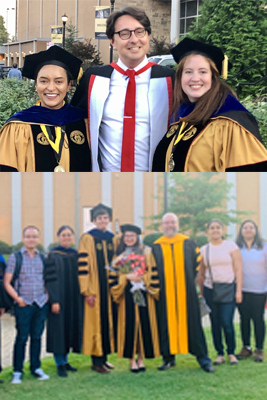Are you in or thinking about a PhD program? Here are a few things to consider

KENNESAW, Ga. (Oct 8, 2019) — If you're unhinged enough to consider going for that ultimate academic prize and you're reading this article, it's clear you need all the help you can get. While there's no secret sauce recipe, there are a few things I've observed over the past 10 years of working with PhD students in interdisciplinary fields that others may find useful.
The objectives of a PhD degree program should be twofold: (1) train individuals to be independent researchers AND (2) offer a pathway to become a "thought leader" in your field of study. This means that a PhD curriculum should include heavy emphasis on the theoretical and evidence-based knowledge of the field and the technical skills to understand and carry out research. Importantly, faculty also recognize that doctoral educated leaders to be need more than just technically competent, they also need oral and written communication skills, teamwork, and the ability to apply current research to business, legal, ethical, and scholarly problems. There is still a role for public intellectuals.
During the course of a PhD program, faculty expect that you will participate in curricular and co-curricular activities. Why? Because not everything that makes up a Ph.D. program is found in the course catalog or on plan of study. In fact, many of the lessons that prepare you for a career as a Ph.D. educated individual will be learned outside the classroom. These lessons might include:
- working with faculty and student colleagues on a research problem unrelated to your dissertation topic
- learning to simplify difficult concepts for a classroom of undergraduates
- clearly presenting your research to a room of colleagues at an academic conference,
- writing a report that will have a real impact to a business or in your community, or
- driving scholarly innovation and thought leadership through a cutting-edge academic publication.
These experiences teach latent skills like time management, team building, and producing high-quality deliverables on a timeline, which are expectations for you once you earn the title “Dr.”
...not everything that makes up a Ph.D. program is found in the course catalog or on plan of study.
If you take full advantage of all the available opportunities, by the time you graduate,
you should be well prepared to pursue a career in the private or public sector as
a "practicing academic" and/or a tenure-track faculty at a university. As you look
at all the materials available about potential PhD programs and/or progress through
your program keep these important points in mind.
- Treat this like your job, since being a PhD student is hard work. To increase your probability of success – I suggest being on campus at least 4 days per week and around other students/faculty – be engaged in the culture – be a good program citizen.
- Ask questions when they occur to you. You’re probably not the only one who is curious AND you’re not bothering anyone, it’s our job.
- A Ph.D. is not just a collection of courses, it’s a sort of apprenticeship. Choose a mentor (or two).
- The sooner your dissertation advisor and committee are on board, the better. See #3 above.
- A dissertation is an original work of scholarship that makes a unique contribution to the field. That contribution might be big, small, an application of an old idea to a new problem, or introducing one part of the field to another.
- A Ph.D. has 4 essential steps – Coursework; Comps; Proposal; Dissertation. The rest is important, but meaningless if you bypass the essentials.
A final note, while I sometimes find myself reflecting on my own experiences as a student that is getting further in the rearview mirror each year. Faculty may regale you with their stories (which are often parables or fables of sorts for you about an issue you are bringing to us) but your experience is your own. Increasingly, forums like LinkedIn and Twitter are places where PhD students and faculty go to share their experiences and stories. It can be isolating being a student, but remember that the faculty really are there to help you succeed.











